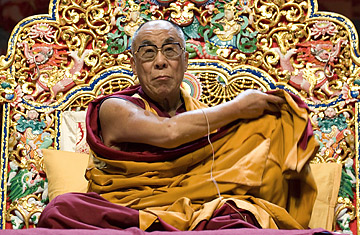
Tibetan spiritual leader the Dalai Lama
If you're in a mess, say yes. That may be what Taiwanese President Ma Ying-jeou was thinking when he gave his official nod to the controversial visit of the Dalai Lama, Tibet's leader-in-exile, to Taiwan next week. Ma has been facing his lowest approval ratings — around 20% — since he took office more than a year ago. The public has been angry with his lack of strong leadership and with the slow pace of relief efforts since Typhoon Morakot hit Taiwan on Aug. 8, bringing the worst floods in 50 years and leaving at least 568 dead or missing and more than 7,000 homeless.
Local government leaders of the opposition party in the south — the area hit hardest by the typhoon — invited the Dalai Lama to comfort and pray for the victims of the worst natural disaster to hit the island since a 1999 earthquake killed more than 2,400. The Dalai Lama will arrive on Aug. 30 to give speeches and visit disaster areas for six days. This will be his third visit to Taiwan; the first two were in 1997 and 2001. The presidential office said it agreed to this visit on religious and humanitarian grounds, adding that it believed the visit would not harm relations with China.
Just nine months ago, Ma had rejected a visit from the Tibetan spiritual leader, whom the Buddhist community had invited, because he didn't want to upset Beijing. Ma said then that "the time was inappropriate" for such a visit. Forging closer ties with China, Taiwan's longtime political rival and military threat, has been Ma's biggest priority and achievement so far as President. In his short time in office, he's reached milestones such as opening up investment and tourism to the Chinese and establishing direct transportation.
As expected, China promptly expressed its opposition to the visit. The day after Ma's announcement, China's Taiwan Affairs Bureau said, "No matter under what form or identity Dalai uses to enter Taiwan, we resolutely oppose this," according to the Xinhua news agency. China is sensitive to prominent overseas visits by the Dalai Lama, whom it accuses of seeking independence for Tibet. Beijing boycotted an E.U. summit last December when French President Nicolas Sarkozy said he planned to meet with the exiled Tibetan leader.
But the brunt of China's statement was aimed at the opposition Democratic Progressive Party (DPP), not the Ma administration. "Some DPP members have taken the chance to plot the Dalai Lama's visit to Taiwan," Xinhua reported. "Obviously this is not for the sake of disaster relief. It's an attempt to sabotage the hard-earned good situation in cross-strait relations." Political commentator Antonio Chiang says China's obligatory protest will not hurt Ma's platform of improving relations. "Beijing is going to make some noise, but that's it," he says. "They understand Ma's in big trouble." Beijing, whose goal is eventual unification with the island, is wary of the DPP, which leans towards independence for Taiwan, and would certainly like to see Ma re-elected in 2012. Ma's drop in popularity is probably more of a concern to China than the Dalai Lama's visit is.
China has long struggled to rein in independence movements in Taiwan and the semiautonomous regions of Tibet and Xinjiang, where deadly riots over ethnic tensions between the Han Chinese and Uighur minority unfolded in July. With the moderate Ma as President, Beijing's fears over Taiwan have been alleviated, as Ma promised not to declare independence during his term. "[Beijing] needs Ma more than Ma needs Beijing now," says Chiang.
And for Ma, the current challenge is not consoling his giant neighbor but winning back the hearts of his own people. "There are now people who are thinking about the return of the DPP," says Lin Chong-pin, a political scientist at Tamkang University. "If the 2012 election was held now, Ma would be bound to lose." Taiwan's reception of its Tibetan guest next week is Ma's bet to boost public sentiment. Though Ma is unlikely to meet with the Dalai Lama officially, the two may appear together at religious gatherings for the victims. Lin says, "On balance overall, I think it will help Ma more than hurt him."
